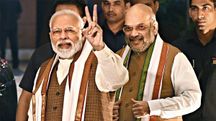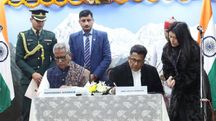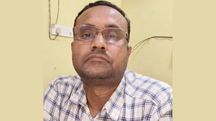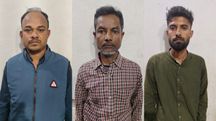Assam government take steps for cadaveric transplantation, gives priority to kidney
Assam Health Minister Keshab Mahanta stated that the state government had begun the process of cadaveric transplantation, with kidneys receiving priority.
 Assam government take steps for cadaveric transplantation
Assam government take steps for cadaveric transplantationAssam Health Minister Keshab Mahanta stated that the state government had begun the process of cadaveric transplantation, with kidneys receiving priority.
Many legal concerns must be considered, the minister said at an eye donation programme here.
More than 200 people promised their eyeballs, maybe the most significant number in the state to do so on one occasion.
When the current Chief Minister, Himanta Biswa Sarma, was the health minister in 2017, Assam adopted the Organ Transplant Act, of 1994, and since then, eye banks have been established at the Gauhati Medical College Hospital (GMCH) and the Assam Medical College Hospital in Dibrugarh, Mahanta explained.
The GMCH has begun the process of organ and tissue transplantation, and "we are progressing in a planned manner with priority being given to kidney transplants," he stated.
Also Read: Indian Medical Association condemns Kamrup DCs on camera misbehaviour with a doctor
Mahanta stated that he was overwhelmed by the many individuals who came forward to commit their eyeballs, demonstrating that science had dispelled many of the irrational beliefs linked with death.
''Those who have vowed to donate their eyes today must promote greater awareness about this and urge other people to follow in their footsteps,'' said the health minister, who also donated his eyes on the occasion.
The event was hosted by the Suprabhat Kalakshetra Trust in cooperation with the Sankardeva Nethralaya in Guwahati and the Srimanta Sankardeva Kalakshetra Society. According to Harsha Bhattacharjee, President of Sankardeva Nethralaya, there is a widespread misperception that the complete eye would be removed when only the cornea is transplanted.
''Human cornea donors are in short supply, and we encourage individuals to give so that the problem of corneal blindness can be addressed to some extent,'' he added.
Assam lags behind in organ transplantation, thus Bhattacharjee asked the minister to take steps to establish organ and tissue banks in all state government hospitals. Furthermore, even when donors come forward, it is difficult to harvest the organ and store it properly, but if organ banks exist, they can deal with the many steps involved methodically, he added.
''Pledging the eye or any other organ is also not enough as after death the next of kin becomes the owner of the body and if they do not consent, the organs cannot be collected. Persons pledging their organs must discuss it with their kin,” he said.
Bhattacharjee pointed out that not more than 10 per cent of the eyes pledged are practically utilised though now there are counsellors who try their best to motivate the family members to carry out the wishes of the dead person.
Chief Convenor of Suprabhat Kalakshetra Pradip Pujari said that this single largest eye donation programme was just the beginning. They hoped to create a movement whereby many more will come forward to pledge not only their eyes but also other organs for transplantation as well as scientific research.
Copyright©2026 Living Media India Limited. For reprint rights: Syndications Today









